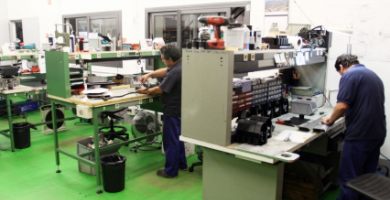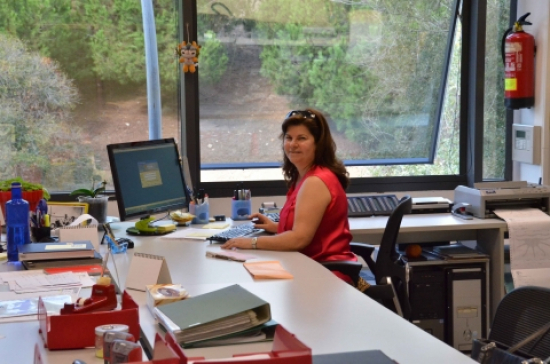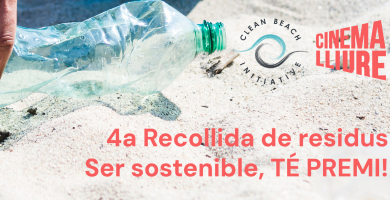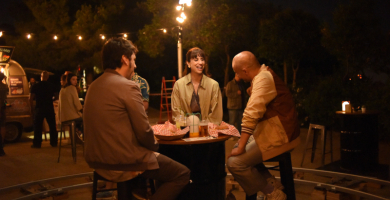
SERVICEVISION: “We need to sit down and talk with people from the industry to know what our problems are”.
We interview Andrés Vallés and María de los Ángeles Casal, two of the managers of Servicevision. The company was founded in Barcelona in 1986 by the Vallés brothers to offer technical services to the film industry. Although they began by developing optical systems and renting out equipment for shootings, the company then began to manufacture its own products and its renowned Scorpio head can be found on shootings worldwide.

When and why did you decide to go from renting to creating your own equipment?
Andrés Vallés: We had always rented, but at the same time we converted the lenses and we made small cranes. That’s how we started. Renting helped us to finance what we produced, because there wasn’t any money. Like Americans who begin in a garage, we started out in small premises in Hospitalet. Now we sell worldwide. Sixty per cent of our turnover comes from abroad.
Your flagship model is the Scorpio Head, which is used on a great many action films such as James Bond, Mission Impossible and X-Men, and which has helped you to break into the international market. How did it arise?
María de los Ángeles Casal: We began by producing an aluminium crane which needed a head, which we bought. When we went to pick it up in England, the owner gave us a great deal of problems. He treated us as if we had just begun. He told us not to raise so many objections, that if we wanted it all right and if not he would sell it to someone else. It was as if he was looking down on us. At that time, my husband Alfredo bought the head and the conversation ended. But when he came back here he was furious. The head caused a lot of problems on the axis. So the two brothers decided to produce one. They didn’t want people making fun of them any more. That’s how the Scorpio Head came into being, after two years perfecting it, looking for money and even asking the family for help. We managed to take the prototype to a fair in Los Angeles. We presented it in Las Vegas. We stayed in a sleazy little motel. That’s how we started out.
And you went on to produce other types of equipment.
A: Telescopic cranes, heads and accessories for the film world.
M.A: We already produced the aluminium crane which went with the first Scorpio head. That was the first thing that we did. With the success of the head, we then began to get involved in other things. Andrés said: “If we are going to devote ourselves seriously to production, we must have a workshop. We need more machines”. So right then we decided to have a rental branch and a production branch, but with a decent workshop. We set up the workshop and looked for people and machines. Little by little.
What are the advantages of manufacturing your own products?
A: We can do it how we want and according to what the market wants. Look, in this photo you can see Spielberg shooting with our head.
M.A: The fact that we have rental puts us in touch with the operators, the crane operators, the grips, with everyone. They tell you: “The new head that you have brought out looks very nice, but it seems to make such and such a movement which isn’t good or the joystick is more comfortable like that”. We listen to them and, as we are manufacturers, we can make what the client asks for.
Tailor-made for the client, on demand for the market.
M.A: With the objections raised, improvements or amenities proposed, we try to adapt it to production. Although it is one thing to say I want this device to do that and another for it to fit in with the mechanics, electronics or software. This is important. Then we customize it for you as you want. Like if you want it with spots. In Japan they ask us for that kind of thing. Or for left-handed people. We customize it. We are the worldwide Rolls-Royce or Maserati in what we do.
A: We also specialize in the production of software, which is very important. This tends to be done by another company for most people. We are in charge of the mechanical, optical and electronic production and the software design. In Japan they say that if rental companies don’t have a Scorpio product they are no good.
You are responsible for the whole process.
M.A: We make the technology. A formula was made to create the glass of the lenses and a manufacturer produces it to a formula that I gave him. Obviously, I cannot manufacture the glass because I’m not devoted to that. But we gave him the formula.
A: Because we are already of a certain age, but if we were 15 years younger, we would produce the glass.
And how did you manage to reach this international level?
A: Thanks to quality, service and after sales. To our perseverance. Any client can call and in less than 24 hours they have our products.
Is the after-sales or after-rental service that you offer as important as the production or rental?
M.A: That is what gave us the idea of opening the company in the US. We went to the fair on the cheap to present the product. Some people said: “Spain? Where’s that?” Seriously, the Americans had no idea. But the product worked and it was good. They began to believe in it and to buy it. What is good about the Americans is that when something is good and they recognize it, they look for you. The problem was: what happens if it breaks down when you’re on the other side of the pond? To solve this we decided to set up a company there. We also carried out repairs and we covered Canada and South America. We grew thanks to word-of-mouth and the fairs in Las Vegas and Los Angeles each year.
What kind of products are most in demand for both rental and purchase?
M.A: I can tell you that for purchase they all are. We sell both telescopic cranes and heads. We have now brought out a small crane, the 10, which is very versatile and very convenient. More than anything thanks to the versatility of movement; it is very light. And we are selling them like hot cakes. This year is on fire. And with rentals, the Scorpio Arm does well; it is a product which became fashionable four or five years ago. Now nobody films with a crane and a camera car. It seems that if you don’t shoot with a Scorpio Arm you’re not cool. And always the latest cameras. People want the last thing on the market. In other places, the director or the operator says I have this project, this story and I need this, this and this and I don’t need that. Here they always take the last thing that came out and adapt it to the project and I think that this is a mistake.
Do you also offer training for the products that you design yourselves?
A: They come here for the training. Every week we have Chinese, Japanese, Americans, English.
M.A: We have people every week. They always stay from Friday to Monday to take advantage of the weekend and visit Barcelona. We provide everything: the set, lighting, cameras. They only need to bring the actors.
A large part of your business is for advertising, including the sets that you have. Why do you think it is above all advertising and not films?
A: Madrid is stronger in films. I would say that here we make films which are good but it is not the same to shoot a film with €15m or €25m there as one here for half a million.
M.A: In any case, since I entered this world, and don’t ask me why, but Barcelona has always been more for advertising and films have always been in Madrid. I don’t know whether it is because there are better natural settings, the way of working is different, I don’t know.
A: In the beginning it was Barcelona, but then films went to Madrid. We are more interested in Barcelona being seen abroad as a major film set and this is a big mistake. If only three important productions a year can come here?
M.A: Advertising brings in more money than films.
A: When Coca Cola, Nike or another brand comes to make an advert, remember that they leave money in the city because they come to shoot, but they also go shopping for a Louis Vuitton bag on Paseo de Gracia, and they go to eat in the best restaurant. And the council doesn’t realize all this.
M.A: Each service which comes here to shoot does not just stay for the filming. There is the money from the shoot itself, catering, staff, set, etc., but there is also a benefit for the city: the actor, director, photographer or whoever says: “I’ve been told that you eat well in Can Roca, I’m going to shoot, but I want you to get me a table there. Where is the golden mile here? On Paseo de Gracia? Keep that day free for me to go shopping”. A model goes to Chanel and buys three bags. I saw Bar Rafaeli and she bought four Chanel bags and each one cost a fortune.
A: It’s not the shoot which helps the city; it’s the money they spend. This helps the entrepreneur, people who do things, the craftsperson.
M.A: All this is money which moreover stays here. Because Barcelona is in fashion and they like the city, the atmosphere and going out at night. This is money which is also part of the shoot. Some want to go around in a Porsche or a Lamborghini and they rent it. There is a lot of movement apart from the shoot. Even more than the shoot. All the people involved, the shops, restaurants, hotels, the beauticians, masseurs, hairdressers, all this is money.
What do you think the Barcelona Film Commission can do to help companies like yours?
M.A: You need to look out more for the industry, for social welfare, the workers, the entrepreneur and to seek a balance. Rather than separating, you need to unite and raise awareness. Here we have a film and advertising industry. What can we do to improve it? If they shoot in the street: What do they need? What security? But maintaining a balance and consulting the people involved about what would be good or bad. To make things easier for the producers and to speed up the permits.
A: It is very important to obtain the permits quickly. An agency encounters a story and they think: “It would be fantastic to shoot in the streets of Barcelona”. They decide that today and tomorrow they want to shoot. But no, you need two weeks to apply for a permit. And they don’t know whether they’re going to get it. So they go to Valencia or Madrid.
M.A: And the prices, the money, because it is much more expensive. I think that we need to sit down and recognize that in Catalonia there is a film and advertising industry that we need to encourage and favour, always seeking a balance between the rules and the flexibility that can be introduced to ensure that everything goes well. This goes beyond the amount of money that you can collect; you need a broader mind and to think what you are going to gain in the shops, restaurants, … I pay my tax and I want what I give to be proportional to what I receive. At present it is not proportional; I give a lot and I don’t receive much. They should also realize that Catalonia has a film and advertising industry which moves a great deal of money. We are a service and this represents a big production and a lot of material rental. The clients pay when they have to pay, but they are extremely demanding. We are constantly struggling. And we always come across obstacles. Everything is so complicated. Because we don’t we have decent rules. We need to sit down and talk with people from the industry to know what our problems are.










